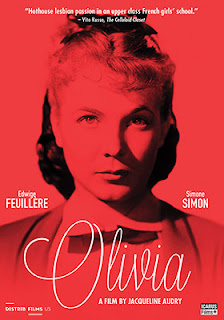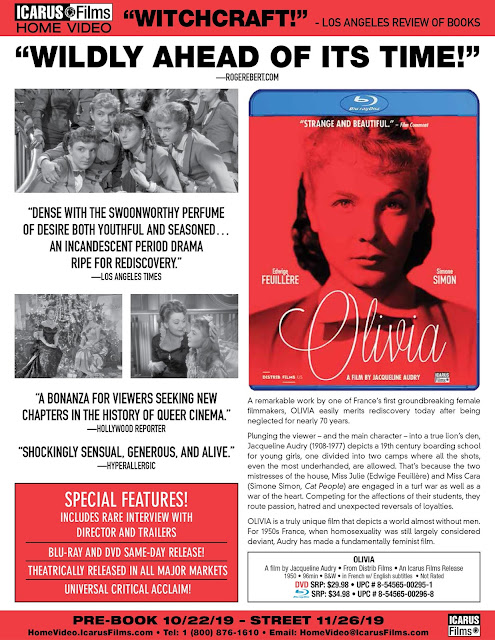Icarus Films, working with France’s premiere film
distribution source, Distrib Films, announced this past week that French
filmmaker Jacqueline Audry’s 1950 (domestic 1954) film adaptation of Dorothy
Bussy’s groundbreaking novel, Olivia,
will be available as both DVD and Blu-ray editions on Nov. 26.
Where does one begin? With the author of the work? With the filmmaker? With the film itself? There are so many elements to the presentation
of this French film classic, both as a recent cinema revival and as a 4K film
restoration for the home entertainment package media marketplace, that just a
simple announcement does not do it justice.
Let’s begin with the author of the work, Dorothy
Bussy. She was born as a member of the
British aristocracy (the daughter of Sir Richard Strachey) in the immediate
aftermath of America’s Civil War. She
lived through the Victorian Age, The Great War and World War II … the arrival
of flight, the atomic age and more.
She was a noted translator of foreign works,
including the first translations of Freud (among others). She was a school teacher (Eleanor Roosevelt
was one of her students), her brother was Lytton Strachey (a founding member of
the Bloomsbury Group and author) and Dorothy married well-below her station (a
French working-class artist by the name of Simon Bussy — a contemporary of
Matisse), which greatly displeased her parents.
 Her one and only novel, “Olivia,” was published
after World War II in 1949, with none other than Virginia Woolf handling the
publishing aspects (a contemporary of her brother and fellow founding member of
the Bloomsbury Group). Her novel, was
based — as legend has it — on her own experiences at boarding school in France.
Her one and only novel, “Olivia,” was published
after World War II in 1949, with none other than Virginia Woolf handling the
publishing aspects (a contemporary of her brother and fellow founding member of
the Bloomsbury Group). Her novel, was
based — as legend has it — on her own experiences at boarding school in France.
It is here that we pick up the film itself, with
Jacqueline Audry doing the direction and her sister, Colette Audry, handling
the adaptation of Bussy’s novel for the screen. For cinematic history, Jacqueline Audry
became something of a footnote, with many of her films falling by the wayside
as time passed. The reason was simple
enough, she did not participate in the rise of the French New Wave, which swept aside the more traditional (“traditional” in
the sense of filmmaking and storytelling) French filmmakers.
 Olivia,
which was released in France in 1950 and arrived on these shores in 1954, was recently
restored and re-released to the domestic arthouse circuit this past summer.
Olivia,
which was released in France in 1950 and arrived on these shores in 1954, was recently
restored and re-released to the domestic arthouse circuit this past summer.
The film follows the boarding school “encounters” of
British student by the name of Olivia (Marie-Claire Olivia — The House
of Dune, The Red Inn … she then disappeared from the
world of cinema, with rumor being that “Marie-Claire Olivia” was not her real
name, but one adopted for the film Olivia),
who arrives at a prestigious French finishing school (her mother once attended)
in the middle of something of an internecine battle between two rival camps,
one supporting Mademoiselle Julie (Edwige Feuillère — Lucrezia
Borgia, The Emigrant, Wicked Duchess,
etc.) and other on the side of Mademoiselle Cara (Simone Simon — Cat
People, The Curse of the Cat People, La Bête Humaine). Julie and Cara are perhaps former lovers.
During her stay at the school, Olivia will ping-pong
between the two women, she will fall in love with Julie, be looked-upon by Cara
(when not suffering from an unknown malady), a death will occur and despite the
taboos of the relationship between a student and a teacher life will go on.
Olivia, a
“lost” treasure, available on either DVD or Blu-ray (4K restoration) from
Icarus Films on Nov. 26 … for cinephiles,
this is a date on the calendar that is well worth keeping.



No comments:
Post a Comment